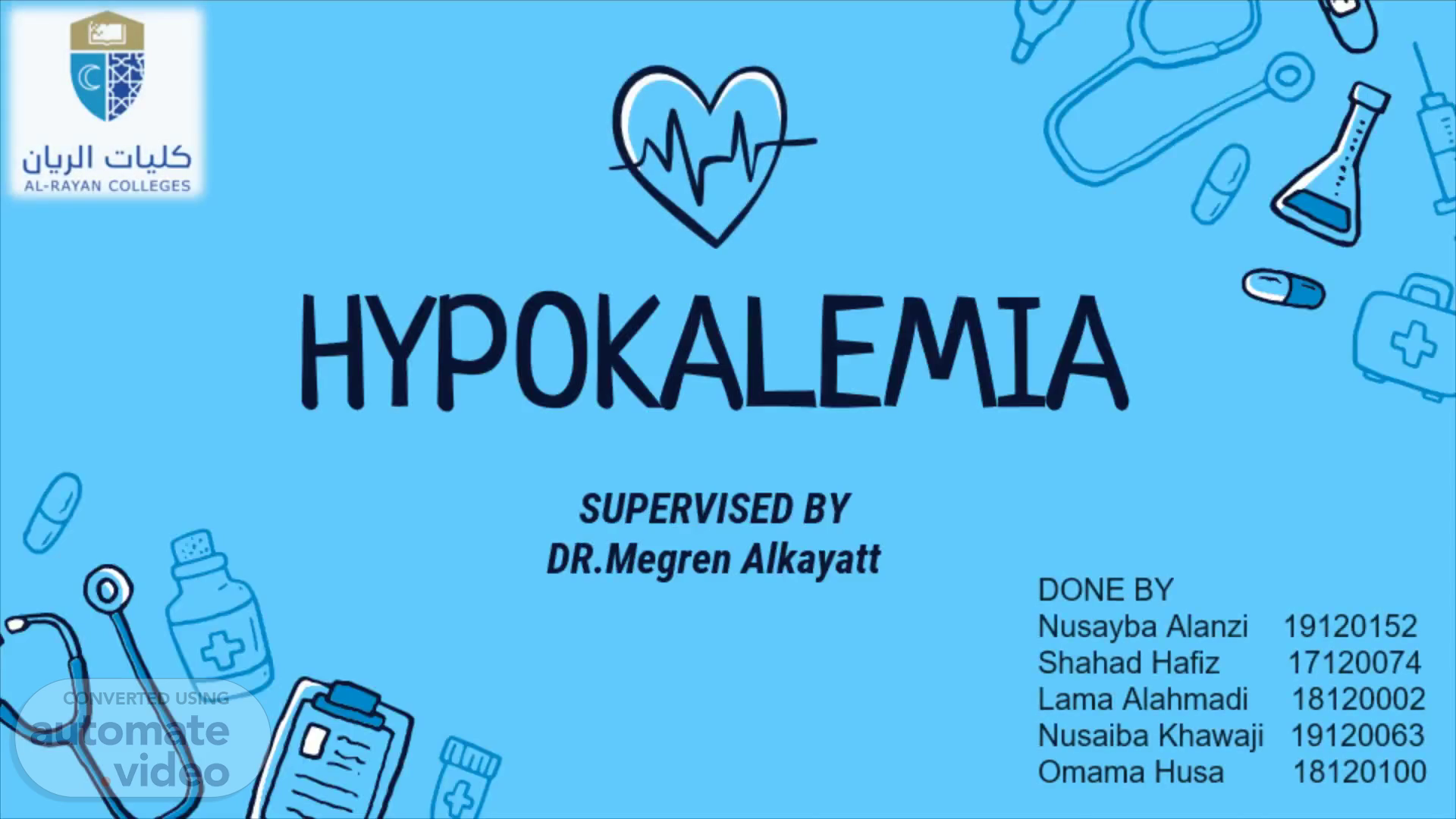Scene 1 (0s)
HYPOKALEMIA. SUPERVISED BY DR.Megren Alkayatt. DONE BY Nusayba Alanzi 19120152 Shahad Hafiz 17120074 Lama Alahmadi 18120002 Nusaiba Khawaji 19120063 Omama Husa 18120100.
Scene 2 (12s)
Potassium is a cation most commonly existing in the intracellular fluid, involved in cell regulation and several cellular processes, and is essential for muscles contraction ,cardiovascular system ,central nervous system and respiratory system ,and maintain osmolarity of ECF and ICF and cellular volume, regulation of acid base balance and Vital for cell excitability . normal levels of potassium 3.5 to 5 mEq /L.
Scene 3 (1m 7s)
decrease in normal levels of potassium in the body one of the most common electrolyte disturbances seen in clinical practice Hypokalemia is more predominant than hyperkalemia; but it ranges from sever to mild depending on the level of decrease of potassium mild is 3 to 3.4 mEq /L , moderate is 2.5 to 3 mEq /L severe when less than 2.5 mEq /L ..
Scene 4 (1m 48s)
Causes of Hypokalemia. . . . . . 01. vomiting. 02.
Scene 5 (2m 23s)
Causes of Hypokalemia. . . . . 06. Older age. 07.
Scene 6 (2m 43s)
Pathophysiology of hypokalemia. The pathophysiology of Hypokalemia is linked to the underlying causes, Can be due to.
Scene 7 (3m 2s)
. Inadequate potassium intake can be a contributor to hypokalemia in the presence of other causes so this cant cause hypokalemia alon.
Scene 8 (3m 31s)
. . Increased excretion. Gastrointestinal wasting.
Scene 9 (3m 51s)
urinary potassium wasting. M ost common cause of hypokalemia loop and thiazide diuretics increase sodium delivery to the distal segment of the distal tubule, this increases potassium loss (causing hypokalemia ).
Scene 10 (4m 20s)
urinary potassium wasting. Hypokalemia is a common feature in patients with Cushing's syndrome , the elevation of cortisol levels leads to a decrease in the blood levels of potassium.
Scene 11 (4m 44s)
Gastrointestinal wasting. large-volume of diarrhea commonly results in hypokalemia due to stool potassium loss. it can occur with all forms of diarrhea but is especially common with diarrhea due to cholera or by chronic laxative abuse.
Scene 12 (5m 22s)
Extracellular/intracellular shift increased intracellular uptake.
Scene 13 (6m 4s)
History of hypokalemia. Do you suffer from sweating ? Do you feel tired? do you feel dizzy often ? How is your appetite ?So you feel hungry? Do you feeling shaky or trembling?. Do you feel nauseous? Do you suffer from vomiting? Do you suffer from involuntary urination? Do you feel pain in your muscles ? Have you ever felt numbness? Do you suffer from constipation?.
Scene 14 (6m 43s)
examination. Blood gas (venous or arterial): metabolic alkalosis.
Scene 15 (7m 25s)
ECG. ECG findings in hypokalemia. We do it to determine if the hypokalemia is affecting the heart. Mild to moderate hypokalemia T-wave flattening ST depression Moderate to severe hypokalemia Presence of U waves To remember that low potassium may result in a flattened T wave.
Scene 16 (8m 6s)
U-waves in hypokalemia. .
Scene 17 (8m 15s)
Further tests. Serum glucose. A cid base balance.
Scene 18 (9m 0s)
Audio Recording ١٤ جما١، ١٤٤٣ هـ، ١٢:٤٤:٣٨ م. Management.
Scene 19 (9m 45s)
Audio Recording ١٤ جما١، ١٤٤٣ هـ، ١٢:٤٥:٢٤ م. . Treatment of underlying condition Diuretic -induced hypokalemia (e.g., loop diuretics or thiazides ) Discontinue or lower the dose of the diuretic and combine it with potassium-sparing diuretics, e.g., spironolactone . If the patient has both volume depletion and contraction alkalosis, rehydrate with normal saline. Oral or IV magnesium for patients with hypomagnesemia.
Scene 20 (10m 5s)
Audio Recording ١٤ جما١، ١٤٤٣ هـ، ١٢:٤٧:٢٦ م. Local irritation from IV potassium may result in heart arrhythmias. As a result, it should always be given slowly (at a maximum rate of 10 mEq /hour via a peripheral line or 40 mEq /hour via a central line). If the concurrent hypomagnesemia is not treated, potassium supplementation will be ineffective. Before replacing potassium, always check the serum magnesium level and replete magnesium. Low magnesium levels might aggravate renal potassium losses..
Scene 21 (11m 11s)
Nusayba Alanzi 19120152 Introduction Pathophysiology Video making Omama husa 18120100 History /examination Shahad Hafiz 17120074 Other tests to be ordered Lama Alahmadi 18120002 Management Nusaiba Khawaij 19120063 Causes.
